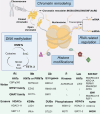Epigenetics and immunotherapy in colorectal cancer: progress and promise
- PMID: 39252116
- PMCID: PMC11385519
- DOI: 10.1186/s13148-024-01740-9
Epigenetics and immunotherapy in colorectal cancer: progress and promise
Abstract
Colorectal cancer (CRC) is a common malignant tumor with the third and second highest incidence and mortality rates among various malignant tumors. Despite significant advancements in the present therapy for CRC, the majority of CRC cases feature proficient mismatch repair/microsatellite stability and have no response to immunotherapy. Therefore, the search for new treatment options holds immense importance in the diagnosis and treatment of CRC. In recent years, clinical research on immunotherapy combined with epigenetic therapy has gradually increased, which may bring hope for these patients. This review explores the role of epigenetic regulation in exerting antitumor effects through its action on immune cell function and highlights the potential of certain epigenetic genes that can be used as markers of immunotherapy to predict therapeutic efficacy. We also discuss the application of epigenetic drug sensitization immunotherapy to develop new treatment options combining epigenetic therapy and immunotherapy.
Keywords: Biomarkers; Colorectal cancer; Epigenetic regulation; Immunotherapy.
© 2024. The Author(s).
Conflict of interest statement
The authors declare no competing interests.
Figures




References
-
- Diaz LA Jr, Shiu KK, Kim TW, Jensen BV, Jensen LH, Punt C, et al. Pembrolizumab versus chemotherapy for microsatellite instability-high or mismatch repair-deficient metastatic colorectal cancer (KEYNOTE-177): final analysis of a randomised, open-label, phase 3 study. Lancet Oncol. 2022;23(5):659–70. 10.1016/S1470-2045(22)00197-8 - DOI - PMC - PubMed
-
- Eng C, Kim TW, Bendell J, Argilés G, Tebbutt NC, Di Bartolomeo M, et al. Atezolizumab with or without cobimetinib versus regorafenib in previously treated metastatic colorectal cancer (IMblaze370): a multicentre, open-label, phase 3, randomised, controlled trial. Lancet Oncol. 2019;20(6):849–61. 10.1016/S1470-2045(19)30027-0 - DOI - PubMed
Publication types
MeSH terms
Grants and funding
LinkOut - more resources
Full Text Sources
Medical

